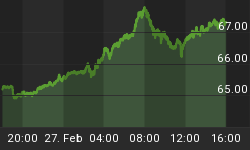Earnings season is upon us, so it's a good time to delve into how earnings affect stock prices. Here's an excerpt from Bob Prechter's February 2010 Elliott Wave Theorist. It considers the conventional belief in a cause/effect relationship between earnings and stock prices. EWI's 50-page Independent Investor eBook includes the entire report on the effect 10 different economic events, political events, and monetary and fiscal policies have on the market. You can download it now for free.
Claim #4: "Earnings drive stock prices."
This belief powers the bulk of the research on Wall Street. Countless analysts try to forecast corporate earnings so they can forecast stock prices. The exogenous-cause basis for this research is quite clear: Corporate earnings are the basis of the growth and the contraction of companies and dividends. Rising earnings indicate growing companies and imply rising dividends, and falling earnings suggest the opposite. Corporate growth rates and changes in dividend payout are the reasons investors buy and sell stocks. Therefore, if you can forecast earnings, you can forecast stock prices.
Suppose you were to be guaranteed that corporate earnings would rise strongly for the next six quarters straight. Reports of such improvement would constitute one powerful "information flow." So, should you buy stocks?

Figure 9 shows that in 1973-1974, earnings per share for S&P 500 companies soared for six quarters in a row, during which time the S&P suffered its largest decline since 1937-1942. This is not a small departure from the expected relationship; it is a history-making departure. Earnings soared, and stocks had their largest collapse for the entire period from 1938 through 2007, a 70-year span! Moreover, the S&P bottomed in early October 1974, and earnings per share then turned down for twelve straight months, just as the S&P turned up! An investor with foreknowledge of these earnings trends would have made two perfectly incorrect decisions, buying near the top of the market and selling at the bottom.
In real life, no one knows what earnings will do, so no one would have made such bad decisions on the basis of foreknowledge. Unfortunately, the basis that investors did use--and which is still popular today--is worse: They buy and sell based on estimated earnings, which incorporate analysts' emotional biases, which are usually wrongly timed. But that is a story we will tell later. Suffice it for now to say that this glaring an exception to the idea of a causal relationship between corporate earnings and stock prices challenges bedrock theory.
For more of Robert Prechter's analysis of cause/effect relationships in the markets, download EWI's FREE 50-page Independent Investor eBook. It includes essays from recent issues of The Elliott Wave Theorist and its sister publication The Elliott Wave Financial Forecast, in addition to a full chapter from the New York Times bestseller, Conquer the Crash. Download your free eBook.
This article was syndicated by Elliott Wave International and was originally published under the headline Earnings Season: Strong Earnings Mean a Strong Stock Market -- Right?. EWI is the world's largest market forecasting firm. Its staff of full-time analysts led by Chartered Market Technician Robert Prechter provides 24-hour-a-day market analysis to institutional and private investors around the world.















